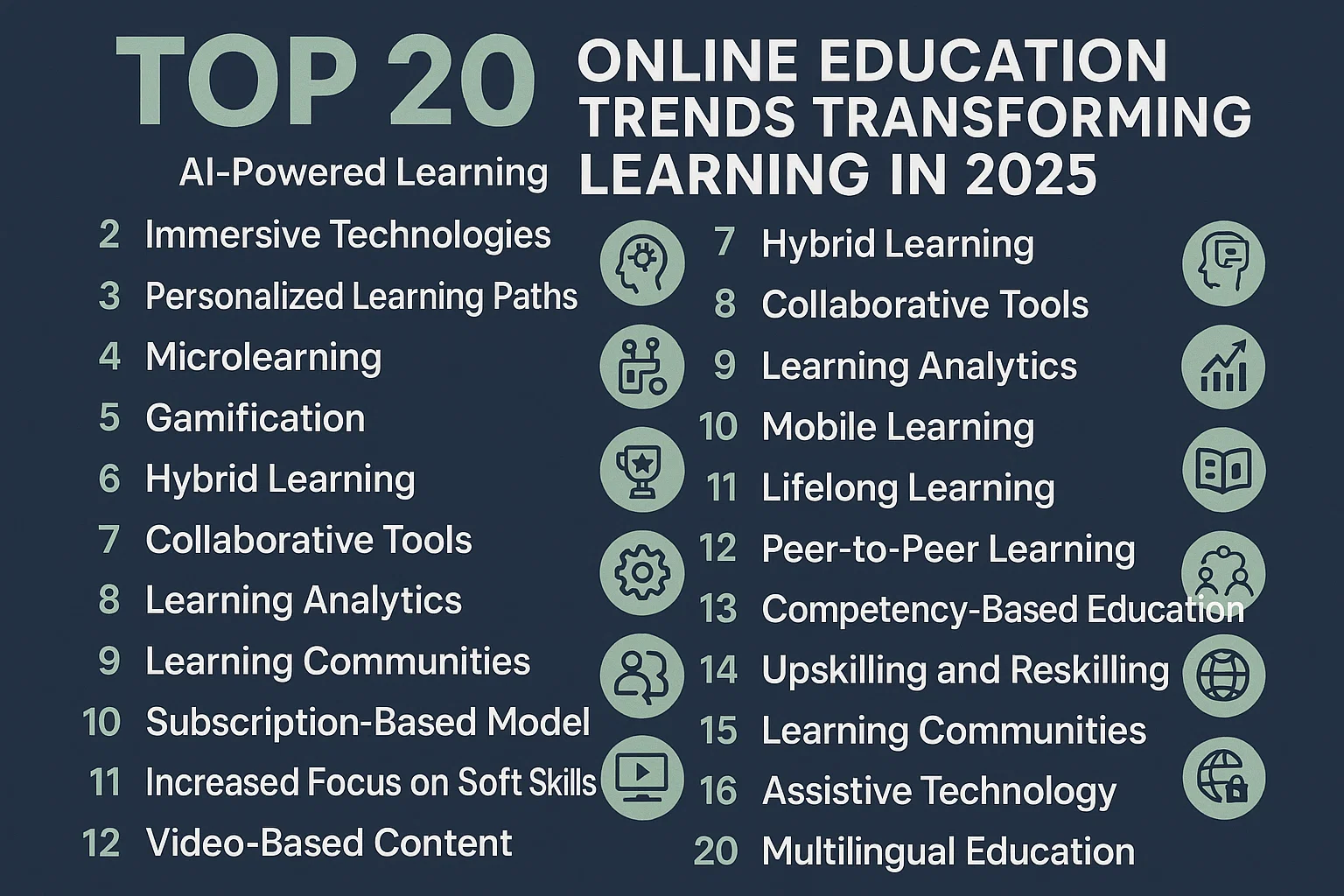Top 20 Online Education Trends Transforming Learning in 2025

Top 20 Online Education Trends Transforming Learning in 2025
Education is no longer limited to traditional classrooms. With the global rise of digital technologies, online learning has become the backbone of modern education. As we step into 2025, online education continues to expand at an unprecedented pace, offering high-quality, flexible, and affordable solutions to students, professionals, and lifelong learners worldwide.
1. Artificial Intelligence in Education
AI-driven learning platforms personalize education, analyze student performance, and provide adaptive learning paths. From chatbots for student support to AI tutors, artificial intelligence is redefining global learning experiences.
2. Virtual Reality (VR) and Augmented Reality (AR)
Immersive technologies such as VR and AR are transforming how students experience complex subjects. Medical students perform virtual surgeries, engineers simulate real-world environments, and language learners interact in virtual settings.
3. Microlearning for Professionals
Short, bite-sized learning modules designed for professionals allow them to learn efficiently without disrupting their work schedules. These micro-courses focus on skill development in minutes instead of hours.
4. Subscription-Based Learning Platforms
Platforms like Coursera, Udemy, and LinkedIn Learning are now offering Netflix-style subscription models where learners gain unlimited access to thousands of courses at a fixed price.
5. Blockchain for Secure Certification
Blockchain technology ensures secure, verifiable digital certificates. Universities and online platforms are increasingly adopting blockchain-based degrees and micro-credentials to prevent fraud.
6. Global EdTech Investments
The EdTech industry is booming, with billions of dollars invested in AI learning platforms, gamified apps, and cloud-based learning solutions. Investors are betting big on education technology’s global reach.
7. E-Learning for Corporate Training
Companies worldwide are adopting e-learning solutions for employee onboarding, compliance, and skill development. This shift reduces costs and ensures consistent training across multiple geographies.
8. Lifelong Learning as a Necessity
In 2025, learning doesn’t stop at graduation. Professionals need continuous upskilling to stay competitive in industries like IT, finance, and healthcare, where knowledge updates are frequent.
9. Gamification of Education
Games, rewards, and interactive quizzes keep learners engaged. Platforms using gamification strategies report higher completion rates and stronger knowledge retention.
10. Language Learning Apps
Apps like Duolingo and Babbel are incorporating AI, AR, and voice recognition, making language acquisition easier and faster for learners across the globe.
11. Remote Proctoring for Exams
Secure online examination tools with AI-based proctoring are becoming standard, enabling students to take globally recognized exams from the comfort of their homes.
12. STEM & Coding for All Ages
STEM education and coding platforms for children and adults are witnessing exponential growth, with governments pushing for early exposure to programming and digital literacy.
13. Data-Driven Learning Analytics
Education institutions are leveraging big data analytics to assess performance, track progress, and create customized curriculum models that maximize learning outcomes.
14. Mobile-First Education
With smartphones being the primary device for millions, mobile-first learning platforms are designed to deliver seamless, accessible education on the go.
15. Global Collaboration Classrooms
Cross-border classrooms are emerging, where students from multiple countries learn together via video conferencing, building global exposure and cultural exchange.
16. Online MBA and Professional Degrees
Affordable, globally accredited online MBA and professional degrees are growing in popularity, especially among working professionals seeking career advancement.
17. Edutainment: Learning through Entertainment
Education is blending with entertainment through podcasts, YouTube learning channels, and interactive storytelling platforms.
18. Cloud-Based Learning Infrastructure
Cloud computing enables scalable online learning, allowing millions of users to access learning resources anytime, anywhere with reliability.
19. Sustainable Education Models
Eco-friendly learning approaches are gaining momentum, reducing paper usage and carbon footprints through fully digital systems.
20. The Future of Education: Hybrid Learning
The hybrid learning model, a mix of offline and online education, is set to dominate the future, providing the best of both worlds to learners worldwide.
Conclusion
Online education in 2025 is not just a trend—it’s the new normal. With high-paying EdTech markets, global opportunities, and innovative technologies, education is more accessible, engaging, and impactful than ever before.
Comments (3)